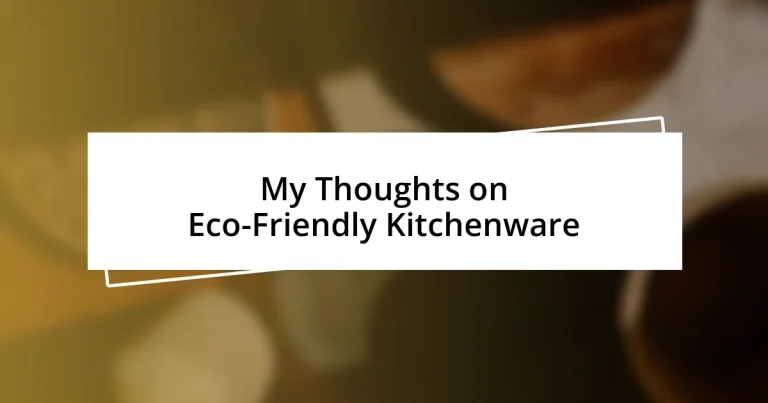Key takeaways:
- Switching to eco-friendly kitchenware, such as bamboo and glass, enhances cooking experiences while promoting sustainability and health.
- Using eco-friendly products fosters mindfulness and a greater appreciation for the environment, transforming daily kitchen habits into conscious living choices.
- Incorporating sustainable practices like meal prepping, composting, and using reusable cloths further supports a commitment to reducing waste and nurturing the planet.
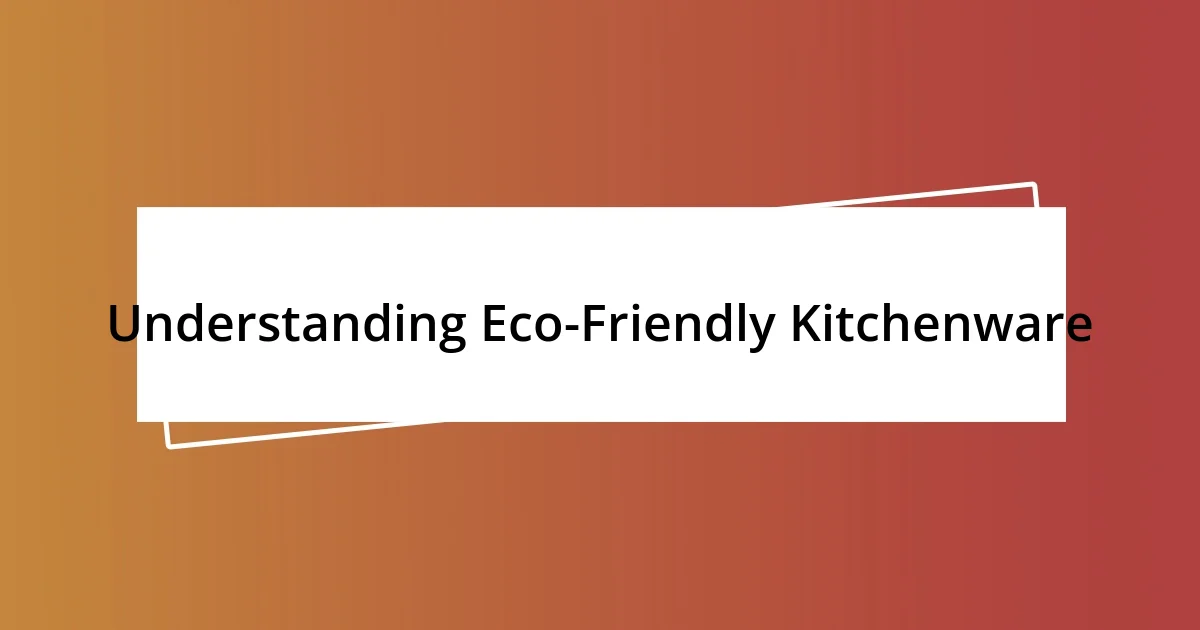
Understanding Eco-Friendly Kitchenware
When I first started exploring eco-friendly kitchenware, I was amazed at the range of materials available. From bamboo utensils to stainless steel storage containers, these items don’t just reduce waste; they often enhance the cooking experience too. Have you ever noticed how using a wooden spoon feels different from plastic? There’s something satisfying about the tactile quality of natural materials that plastic simply can’t replicate.
It’s also important to understand the impact of our choices on the environment. Each time I swap out a plastic item in my kitchen for something sustainable, I feel a small but significant shift in my eco-conscious journey. Isn’t it uplifting to think that our kitchen habits can contribute positively to the planet? It’s not just about reducing waste; it’s also about embracing a healthier lifestyle for ourselves and future generations.
Additionally, eco-friendly kitchenware encourages mindfulness in our cooking practices. I remember the moment I started paying attention to the provenance of my kitchen tools. Using products that are sustainably sourced and ethically produced made me realize how interconnected we are with the Earth. How does it feel to use something that aligns with your values? For me, it’s a daily reminder to be responsible and make choices that reflect care for the environment.

Benefits of Using Eco-Friendly Products
Using eco-friendly kitchenware brings numerous benefits that extend beyond just environmental impact. One of the most profound benefits I’ve experienced is the sense of satisfaction that comes from making sustainable choices. Every time I reach for my bamboo utensils or my glass containers, I feel a connection to nature and a shared responsibility for its well-being. This small shift in my kitchen has fostered a deeper appreciation for the planet, reminding me that my daily actions can indeed contribute to a larger positive change.
Moreover, eco-friendly products often lead to a healthier cooking environment. I’ve noticed that using materials free from harmful chemicals makes a big difference in my food safety. With traditional plastic items, I’ve often been concerned about potential leaching into my meals. Swapping to stainless steel or silicone not only eases that anxiety but also supports my family’s overall wellness. It’s reassuring to know that my choices are fostering a healthier lifestyle.
Additionally, there’s a unique aesthetic appeal to eco-friendly kitchenware that enhances my cooking experience. I remember hosting a dinner party where guests commented on how beautiful my glass storage jars looked on the counter. They not only serve a practical purpose but also add an element of beauty and sophistication to my kitchen. Have you ever considered how your kitchen’s aesthetic can influence your cooking spirit? For me, integrating these products creates a more inviting atmosphere that encourages creativity and joy in meal preparation.
| Aspect | Eco-Friendly Products | Conventional Products |
|---|---|---|
| Environmental Impact | Reduced waste and lower carbon footprint | Higher waste contribution and polluting materials |
| Health and Safety | Free from harmful chemicals | Potential leaching of toxins |
| Aesthetics | Natural beauty enhancing kitchen decor | Often plastic and less visually appealing |

Types of Eco-Friendly Kitchenware
When it comes to eco-friendly kitchenware, the variety can be pleasantly surprising, and I often find myself drawn to several key types. For instance, whenever I use my bamboo cutting board, I appreciate how sturdy it is while being gentle on my knives. Bamboo is a fast-growing resource that doesn’t require pesticides, which adds a touch of sustainability to my kitchen routine. It’s those little choices that reinforce my commitment to living more consciously.
Here’s a quick look at some popular types of eco-friendly kitchenware:
- Bamboo Utensils: Lightweight and biodegradable, perfect for cooking and serving.
- Glass Containers: Durable and free from harmful chemicals, great for food storage and meal prep.
- Stainless Steel Cookware: Long-lasting and recyclable, ideal for healthy cooking without leaching.
- Silicone Bakeware: Versatile and free from BPA, perfect for non-stick baking while being reusable.
- Natural Fiber Dishcloths: Compostable and effective, they reduce reliance on paper towels significantly.
Each of these items allows me to ditch plastic and supports a more sustainable kitchen without compromising on functionality. I remember the first time I replaced my plastic mixing bowls with those made from recycled glass; it felt like taking a small but important step toward a greener lifestyle—an upgraded experience that I continue to cherish.
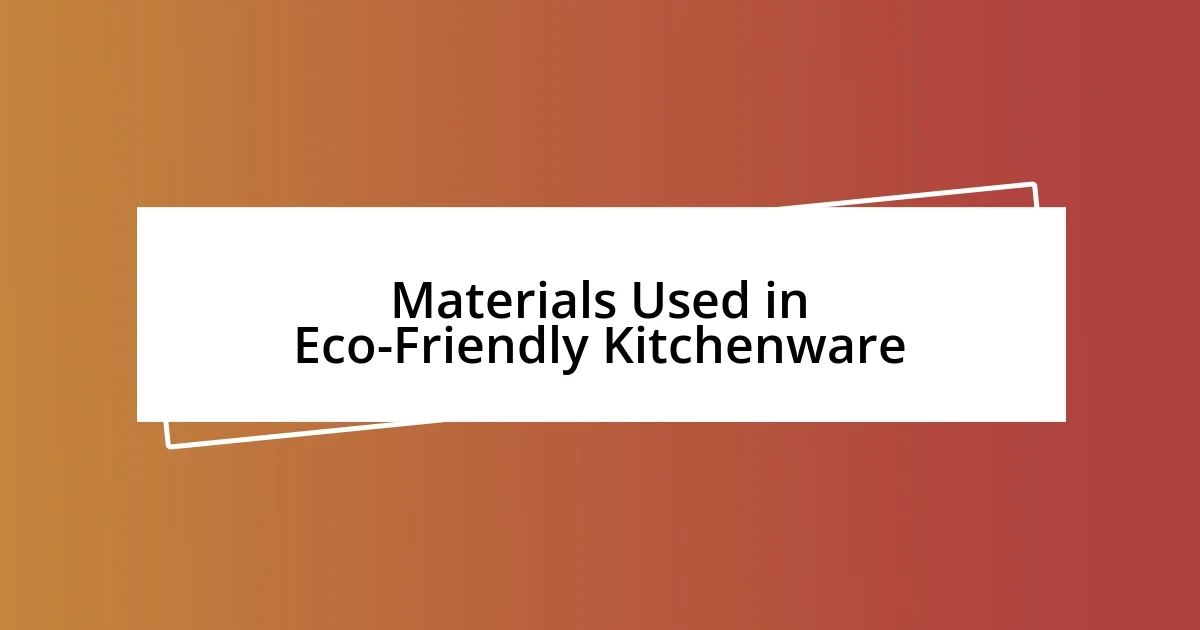
Materials Used in Eco-Friendly Kitchenware
When choosing materials for eco-friendly kitchenware, I’ve discovered that bamboo is a standout option. It’s amazing how a resource as simple as bamboo can be both strong and incredibly sustainable. I remember the first time I used my bamboo whisk — it felt like I was reconnecting with something elemental, and the fact that it’s biodegradable only deepened my appreciation.
Another material that often captures my attention is glass. I can’t tell you how much I love those glass food storage containers! Unlike plastic, they don’t hold onto odors or stains, which makes them perfect for meal prep. The first time I reheated soup in a glass container, I was pleasantly surprised by how it seemed to retain the flavor better. Have you ever considered how your food tastes when stored in different materials? For me, this switch has not only improved food safety but also elevated my cooking experience.
Lastly, stainless steel is a material I truly value for its durability and recyclability. It struck me when I started using stainless steel cooking pots; they heat evenly and clean so easily. I still recall an evening spent making a hearty stew, marveling at how it didn’t stick or burn. Isn’t it comforting to know that by selecting these materials, we aren’t just enhancing our cooking — we’re making responsible choices for the planet as well? Each time I cook with stainless steel, it reinforces my belief that eco-friendly kitchenware is not only a trend but a commitment to a healthier lifestyle.
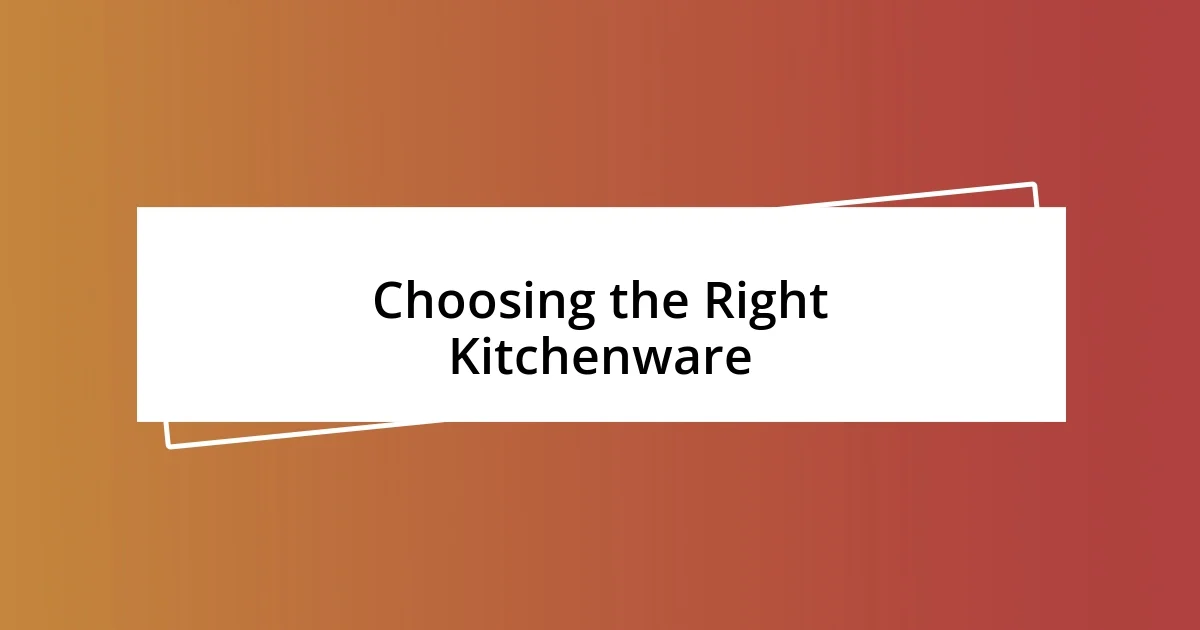
Choosing the Right Kitchenware
Choosing the right kitchenware can feel overwhelming, especially with so many eco-friendly options available. I remember standing in the store, debating between bamboo and silicone utensils, feeling a twist of excitement and apprehension—what if I made the wrong choice? Ultimately, I opted for bamboo, and it’s one of the best decisions I’ve made; the natural feel in my hands makes cooking so much more enjoyable.
Finding kitchenware that works for you is important. I once tried using glass storage containers exclusively, and although I loved how they presented my meals, I quickly realized that the weight wasn’t ideal for my frantic weeknight dinners. Instead, I decided to blend materials, using lightweight silicone for travel and glass at home. It’s all about balancing sustainability with practicality—what fits your lifestyle best?
As I explored the world of kitchenware, I discovered that eco-friendly items sometimes come with a higher price tag. Initially, I hesitated to invest in stainless steel pots, but after experiencing how evenly they cook my famous chili, I understood the value. Isn’t it fascinating how a single thoughtful purchase can transform not just your kitchen, but your entire cooking experience? Each piece I’ve chosen tells a story of conscious living, urging me to consider not just what I cook with, but the impact it has on the world around me.
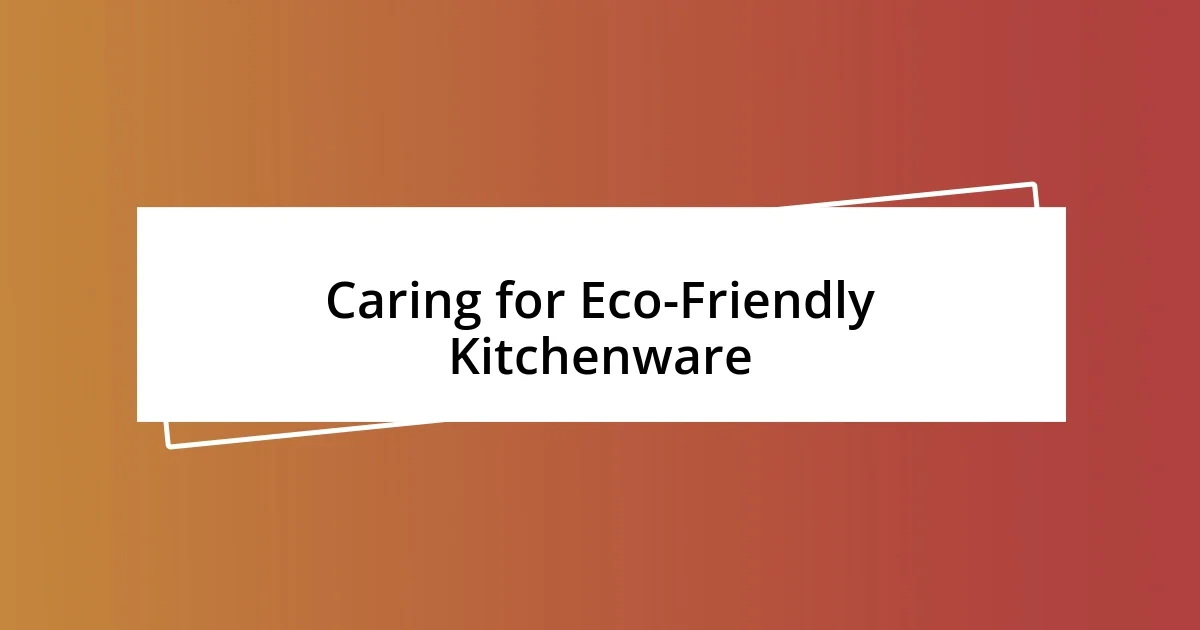
Caring for Eco-Friendly Kitchenware
Caring for eco-friendly kitchenware requires a gentle touch and some thoughtful habits. For instance, I learned quickly that bamboo utensils shouldn’t be soaked in water for long periods; it can actually warp them. Instead, I give them a quick rinse and let them air dry. Have you ever realized how a small tweak in care can extend the life of your favorite tools? It’s like nurturing a plant, where just a little attention can yield a flourishing reward.
When it comes to my beloved glass containers, I take a few extra precautions to avoid sudden temperature changes. The first time I made that mistake, I watched in horror as one shattered when I pulled it straight from the fridge and placed it in a hot oven. It was a tough lesson that highlighted the importance of acclimating my kitchenware. Now, I always allow them to warm up a bit; that way, I can avoid any more mishaps and fully enjoy my cooking!
Stainless steel, in my experience, can really withstand the test of time if cared for properly. I love using a little baking soda and vinegar to clean my pots, bringing back that shine and removing tough stains effortlessly. It’s a therapeutic process for me, and the sense of accomplishment is palpable. Doesn’t it feel great to achieve something with your own hands? By treating our eco-friendly kitchenware with respect, we ensure it not only supports our cooking adventures but also serves our commitment to a sustainable lifestyle.
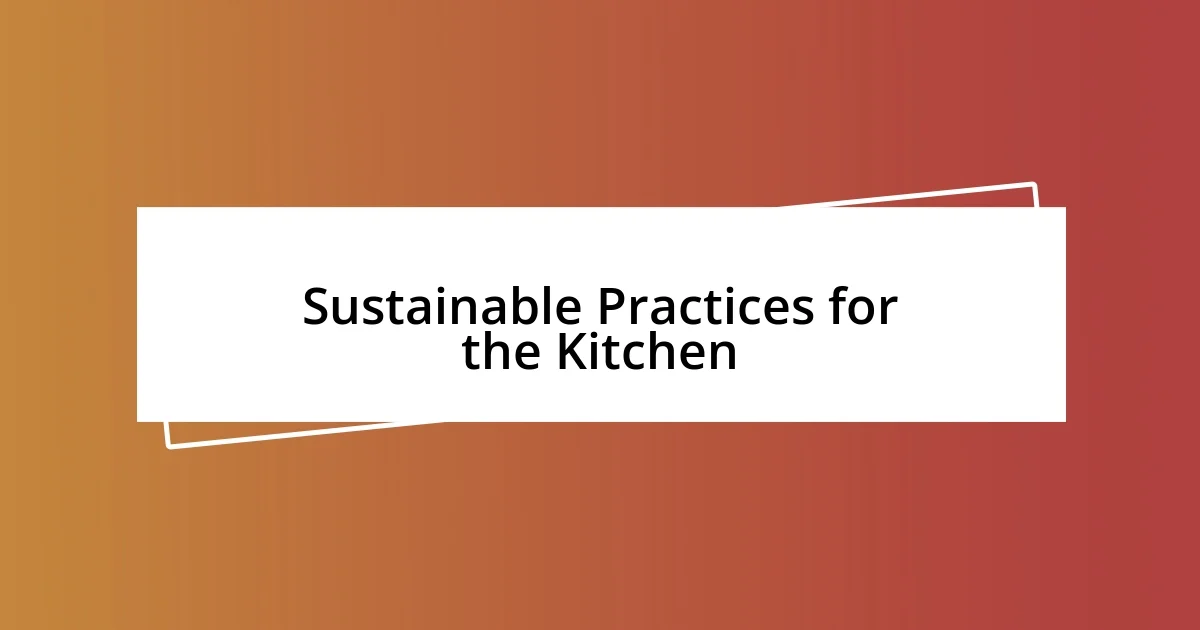
Sustainable Practices for the Kitchen
Sustainable practices in the kitchen extend beyond choosing eco-friendly kitchenware; they also encompass how we use and maintain those tools. I’ve adopted a habit of meal prepping, which not only saves me time but also minimizes food waste. Have you ever noticed how much leftover produce you can save by planning ahead? It feels rewarding to create delicious meals from ingredients that might have otherwise gone to waste.
One significant shift I made is using reusable cloths instead of paper towels. Initially, I thought it would be a hassle, but I found that these cloths are far more effective for cleaning up spills. Plus, there’s something satisfying about tossing them in the wash after use, knowing I’m making a positive impact. Each time I reach for my cloth instead of a roll of paper towels, I feel that I’m contributing to a more sustainable way of living—and it gives me a little thrill.
I also started composting kitchen scraps, which has been a game changer. The first time I added scraps to my outdoor bin, I felt like I was part of a larger mission toward sustainability. It’s incredible how what once was trash can transform into nutrient-rich compost. Have you ever thought about how a simple act in your kitchen can nourish the soil for the next generation? This practice not only reduces waste but also closes the loop in my own cooking cycle.












